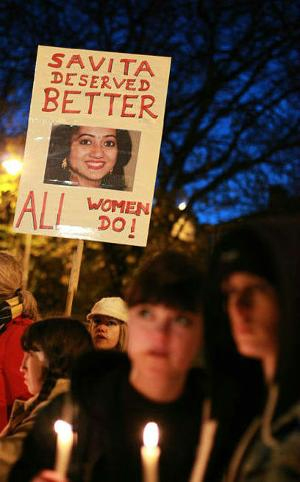 London, Jun 14: An Irish hospital staff failed to adequately assess the condition of Indian dentist Savita Halappanavar and missed an early opportunity to terminate her pregnancy, a key report on her death has said.
London, Jun 14: An Irish hospital staff failed to adequately assess the condition of Indian dentist Savita Halappanavar and missed an early opportunity to terminate her pregnancy, a key report on her death has said.
A clinical inquiry on Savita's death, which was released yesterday, found that the most likely cause of her death was infection- with the risk of infection and sepsis increasing after her waters broke. It warned that such incidents could happen again in the absence of clarity on abortion law.
31-year-old Savita had died of septicaemia in her 17th week of pregnancy at University Hospital Galway in October last year and an inquest into her death held in April heard that she had been denied a potentially life-saving termination on the grounds that Ireland is a "Catholic country".
Her husband Praveen Halappanavar said his wife had repeatedly asked for a termination but was refused because a foetal heartbeat was present.
The review said there had been an over-emphasis on the need to not intervene until the foetal heartbeat stopped and not enough emphasis on the need to focus on monitoring and managing the risk of infection.
Professor of obstetrics and gynaecology Sir Sabaratnam Arulkumaran, who headed the review commissioned by the Health Service Executive (HSE), said the plan in her case had been to "await events", which he said was appropriate so long as it is not a risk to the mother or unborn baby.
He said the mother should not have to deteriorate to a point where she was gravely ill and "at death's door".
"In this case, we found numerous causal and contributory factors that we believe contributed to this sad and tragic case, and these are outlined in detail in our report.
"We established that the patient was monitored less frequently than required and that guidelines for the prompt and effective management of infection and sepsis were not adhered to.
"We also believe that legislative factors affected medical considerations in this case and that this resulted in a failure to offer all management options to the patient," Arulkumaran was quoted as saying by the Irish Examiner.
The case had triggered worldwide outrage and re-ignited calls to re-define Ireland's confusing anti-abortion laws, which demands that doctors treat an expectant mother and her unborn baby as equals.
The HSE says clinical staff at Galway Hospital failed to properly assess or monitor dying woman's condition. Delaying adequate treatment including expediting delivery in a clinical situation where there is prolonged rupture of the membranes and increasing risk to the mother can, on occasion, be fatal.
It was found that the diagnosis of sepsis secondary to chorioamnionitis or septic shock should have merited expediting delivery to reduce risk of infection.
"The gravity of the situation was increasing but appears not to have been recognised and acted upon," it said.
"This was a complex clinical situation and a request for advice/support from a consultant and other specialities would have been beneficial.
The review noted that when Savita's consultant, Dr Katherine Astbury, was finally called to review her patient, she went to collect a scanner on the way.
"The interpretation of the (abortion) law related to lawful termination in Ireland, and particularly the lack of clear clinical guidelines and training, is considered to have been a material contributory factor in this regard," the report added.
It warned that similar incidents with a similar clinical context could happen again in the absence of clarity on the law and a lack of national clinical guidelines.
Arulkumaran has recommended that clinicians, health and social care regulators and politicians consider the law and guidelines on the management of inevitable miscarriage early in pregnancies.
Savita's death thrust the controversial issue of abortion in Ireland into the spotlight.
In response, the Government committed itself to legislate and overnight published a proposed law to allow abortion if there is a real and substantial risk to a woman's life, including the threat of suicide, by July.
The review findings follow an inquest which ruled unanimously that Savita's death was by medical misadventure.
The misadventure verdict found there were systemic failures or deficiencies in Savita's care before she died, but coroner Ciaran MacLoughlin said they did not contribute to her death.
Praveen, 31, said at the inquest that his wife's treatment was "horrendous, barbaric and inhuman" and that she was left to die.





Comments
Add new comment